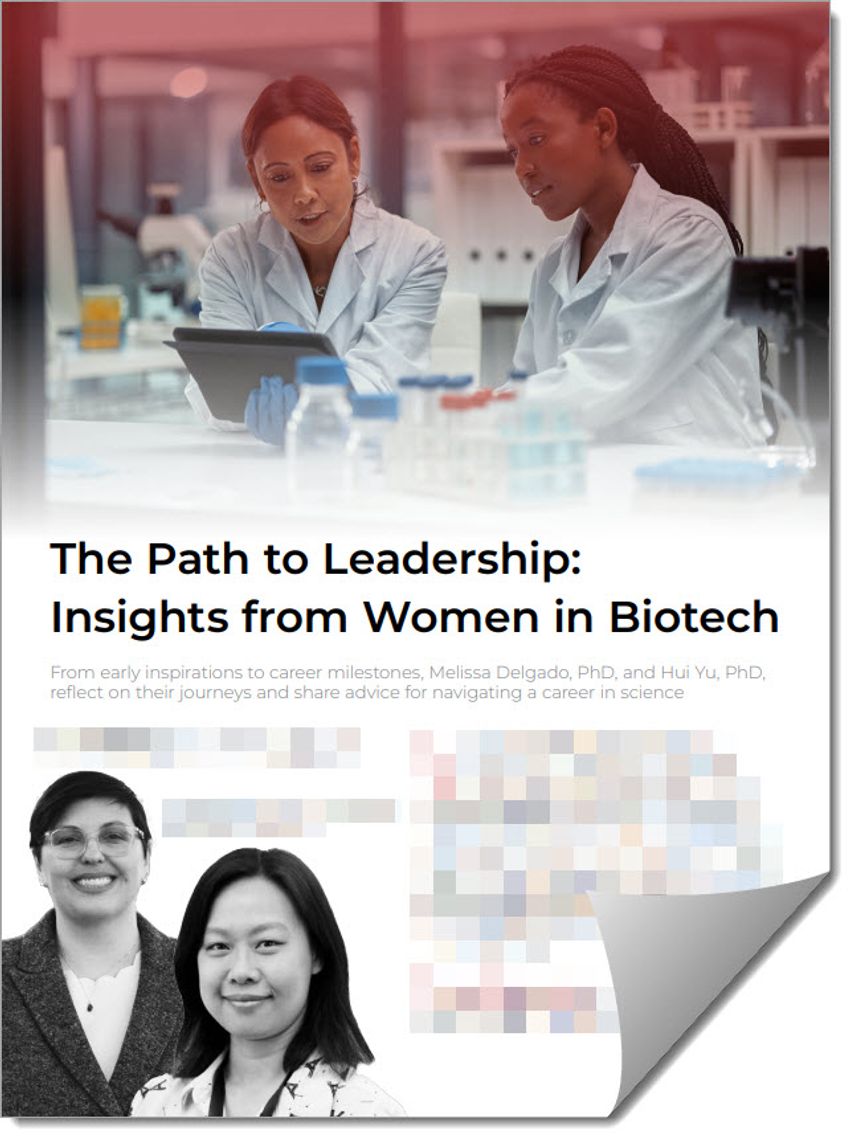The Path to Leadership: Insights from Women in Biotech
From early inspirations to career milestones, Melissa Delgado, PhD, and Hui Yu, PhD, reflect on their journeys and share advice for navigating a career in science Scientific careers can take many forms, shaped by shifting interests, new opportunities, and evolving priorities. For many women, these paths are further complicated by underrepresentation, particularly in leadership roles, along with systemic barriers and biases that limit advancement. In this article, Melissa Delgado, PhD, and Hui Yu, PhD, reflect on their journeys into leadership, the unexpected turns along the way, and the lessons they’ve learned, offering insight into the role of women in science and advice for others in the field.
Career beginnings
Neither Delgado nor Yu followed a traditional path to biotech leadership. For Delgado, science wasn’t initially a natural fit. “High school science classes felt uninspiring, and I struggled to connect with the subject,” she recalled. That changed in college when an infectious disease course—taken as a prerequisite for her dental hygiene major—sparked an unexpected fascination. “That class opened a door I hadn’t expected. It made science feel alive, relevant, and deeply fascinating.” She soon switched her major to biology and later completed a master’s degree. “In my master’s degree, I had full accountability for my research. I learned how to troubleshoot complex problems, manage setbacks, and develop the resilience needed to thrive in a demanding field. It was the first time I truly felt the weight—and the reward—of owning a project from start to finish,” she shared.
From there, Delgado completed an internship with the California Institute of Regenerative Medicine and spent several years working in both academic labs and the biotech industry before deciding to pursue a PhD. “My goal was to continue expanding my knowledge while positioning myself for leadership roles in the corporate world. This decision was driven by a desire not only to grow as a scientist but also to make a broader impact through innovation and strategic development.”
Yu’s journey began during clinical training for her master’s degree in otorhinolaryngology in China. While conducting a research project alongside her clinical work, Yu discovered a love for investigation. “I was fascinated with the nature of scientific study and exploring potential therapeutic solutions,” she explained. That curiosity carried her to the United States to pursue a PhD in biomedical sciences at St. Jude Children’s Research Hospital, where her focus shifted to stem cell-based approaches for treating blood disorders.
After completing her PhD, Yu pursued postdoctoral training at the Boston Children’s Hospital and Dana-Farber Cancer Institute. While she had initially planned to stay in academia, her trajectory changed when she learned about the work being done at CRISPR Therapeutics. “I saw how cells generated in our lab could be shipped to clinical sites and infused into patients. It was the most rewarding moment to witness scientific findings transform into a living drug.” The experience convinced her to pursue opportunities in industry. Reflecting on this transition, Yu added, “Each time I considered a change or transition, it was a special moment for me. Looking back, I am glad I took the opportunity and feel rewarded for what I learned during this journey.”
Overcoming barriers
“Being a woman in science still comes with its share of barriers,” said Delgado. For her, the best way through has been consistency, curiosity, and resilience. “I’ve focused on demonstrating capability by working hard, asking thoughtful questions, and continuously developing new skills. This approach has helped me earn respect and break through many of the challenges that come with being underrepresented in the field.”
Yu pointed to the challenge of balancing professional and personal responsibilities. “Achieving a good work-life balance can be increasingly difficult when you take on more and more responsibility for your role,” she explained. Her strategy has been “to stay connected with family and friends, keep an eye on available resources, and always have a plan B.”
When looking ahead, both women noted that the role of women in biotech is evolving. “Progress is happening, but it’s incremental, and I don’t expect to see sweeping changes within my lifetime,” shared Delgado. “That said, I remain committed to pushing myself and others to the table and making sure our voices are heard.”
Yu emphasized the qualities women bring to the industry and leadership roles. “Women have the great quality of being resilient and persistent. We have equal capability to drive biotech evolutions, and we’ve already seen women take critical leadership roles and shape the industry.”
Where their paths have led
Today, both Delgado and Yu channel their diverse experiences into leadership roles at ACROBiosystems, a biotechnology company that offers scientific services and develops high-quality recombinant proteins, antibodies, and assay kits to accelerate the drug development process.
As senior sales manager, Delgado describes her work as dynamic and people-focused. She spends her time supporting her team—guiding them through challenges, sharing insights, and helping them navigate customer interactions—and meeting regularly with customers across her territory.
“Every day presents new challenges and opportunities, and I thrive on the variety and the chance to contribute to the growth of our business and the success of our partners.”
In her role as field application development director, Yu focuses on bridging science and strategy. She leads strategic engagement with key accounts and industry experts, collaborates with sales teams to translate client feedback into product development priorities, and monitors biotech trends and federal policy changes to inform company strategy.
Tips for navigating a scientific career
Alongside their stories, Delgado and Yu offered advice for other women navigating a career in science.
Learn as much as you can from whoever you can. Seek out guidance from both men and women, from people in different roles and at different stages of their careers. The more varied your mentorship, the more equipped you’ll be to navigate the complexities of a scientific career.
If your gender is brought up in a conversation, don’t let it distract you. Let your actions and words define you. Excellence speaks louder than bias, and persistence is a powerful force for change.
It requires time to build up a foundation. In the meantime, keep an open mind. There is not only one way to pursue science.
At the beginning, your quick learning and technical skills are critical. Later on, teamwork and the ability to present your work can play a greater role in your success.
Be persistent and follow your heart. Your career, no matter if you are in the academic or industrial space, will unfold beautifully.
Science—and the industries connected to it—can be tough. There will be setbacks, criticism, and moments of doubt. But resilience is a skill, and like any skill, it can be strengthened over time.
Driven by innovation and strong leadership, ACROBiosystems provides the tools and expertise to advance drug development.






